Aloe vera is a plant that has been used for centuries for its medicinal and therapeutic properties. It is commonly known for its benefits in treating sunburns and other skin irritations. However, aloe vera has a wide range of benefits that go beyond just treating burns. It is rich in vitamins, minerals, and antioxidants that can help improve the overall health of your skin and hair. In this blog, we will explore the benefits of aloe vera for skin and hair, how to use it in your daily routine, and some tips for getting the most out of this amazing plant.
What is aloe vera?
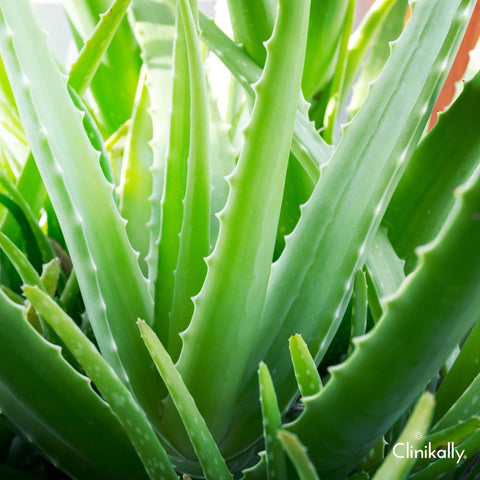
Aloe vera is a succulent plant that belongs to the family of Asphodelaceae. It is native to North Africa, but now grows in tropical and subtropical regions around the world. The plant has thick, fleshy leaves that contain a gel-like substance. This gel is commonly used in various cosmetic and medicinal products due to its numerous health benefits. Before trying any new skin care product for any skin concern it's always best to consult a dermatologist who can provide personalized recommendations based on your underlying condition.
The science behind Aloe Vera's healing properties
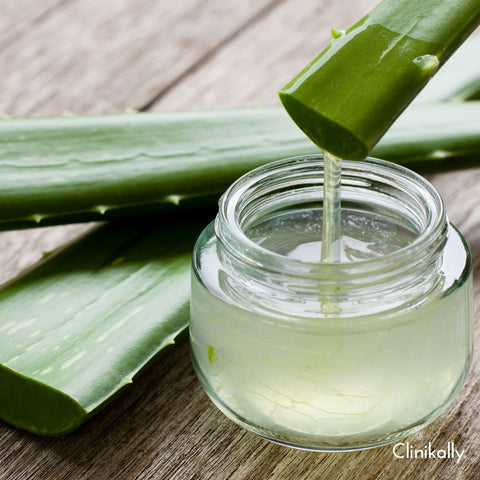
Aloe vera has been used for centuries for its purported healing properties, and recent scientific research has shed light on some of the mechanisms that underpin its effectiveness. Here are some important aspects of the science behind aloe vera's healing properties.
-
Aloe vera contains compounds with anti-inflammatory properties, including bradykinase, salicylic acid, and auxins. These compounds help to reduce inflammation by inhibiting the activity of enzymes involved in the inflammatory process.
-
Aloe vera gel contains polysaccharides like acemannan, which promote skin regeneration and wound healing. These polysaccharides stimulate the growth of fibroblasts, which are cells that produce collagen, the primary structural protein in the skin.
-
Aloe vera gel is high in water content and contains mucopolysaccharides, which help the skin retain moisture. This moisturising effect can help to relieve dry and irritated skin while also promoting healing.
-
Aloe vera contains anthraquinones and phenolic compounds with antimicrobial properties. These compounds can inhibit the growth of bacteria, fungi, and viruses, making aloe vera effective in treating minor skin infections and hastening wound healing.
-
Aloe vera is rich in antioxidants such as vitamins A, C, and E, as well as flavonoids and polyphenols. These antioxidants help to neutralise free radicals, which can damage cells and accelerate the ageing process. By reducing oxidative stress, aloe vera may help maintain skin health and promote healing.
-
Aloe vera contains compounds with analgesic properties, such as glycoproteins, that can help relieve pain and discomfort caused by wounds, burns, and inflammation.
-
Aloe vera gel contains compounds that promote collagen synthesis, a protein essential for maintaining skin elasticity and strength. This can help repair damaged skin and prevent scarring.
-
According to some studies, aloe vera may have mild sun-blocking properties, protecting from UV radiation. However, it should not be used as a replacement for sunscreen, but rather as an additional measure to promote skin health.
Aloe Vera anti-inflammatory properties
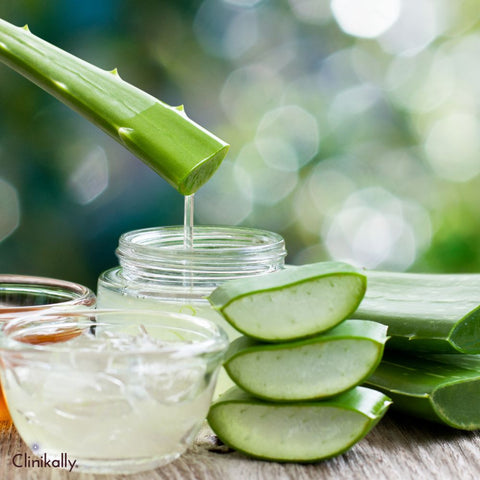
Aloe vera's anti-inflammatory properties are primarily due to its high content of bioactive compounds such as polysaccharides, glycoproteins, and enzymes. Here's how these ingredients contribute to its anti-inflammatory properties:
-
Polysaccharides: Aloe vera contains complex carbohydrates called polysaccharides, which include acemannan. These polysaccharides have been shown to inhibit the activity of pro-inflammatory enzymes like COX and LOX. By inhibiting these enzymes, aloe vera helps to reduce the production of inflammatory mediators such as prostaglandins and leukotrienes, which are involved in the inflammatory response.
-
Glycoproteins: Aloe vera gel contains glycoproteins like aloctin A and B, which have anti-inflammatory properties. These glycoproteins work by inhibiting the release of histamine, a compound that causes allergic reactions and inflammation. By reducing histamine levels, aloe vera can help alleviate inflammation and associated symptoms like redness and swelling.
-
Enzymes: Aloe vera contains several enzymes, including bradykinase, which has anti-inflammatory properties. Bradykinase breaks down bradykinin, a pro-inflammatory molecule that causes pain and swelling. By degrading bradykinin, aloe vera reduces inflammation and promotes tissue healing.
-
Antioxidants: Chronic inflammation is often associated with oxidative stress, which can exacerbate tissue damage. Aloe vera contains antioxidants like vitamins A, C, and E, as well as flavonoids and polyphenols, which help neutralize free radicals and reduce oxidative stress. By combating oxidative damage, aloe vera helps mitigate inflammation and support tissue repair.
-
Hydration and Cooling Effects: Aloe vera gel has a high water content and a cooling sensation when applied topically. This hydration and cooling effect can help soothe inflamed skin and provide symptomatic relief for conditions like sunburn, eczema, and dermatitis.
Aloe Vera juice for digestive health
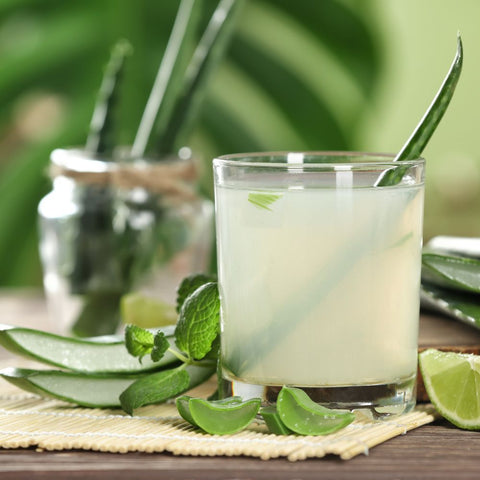
Aloe vera juice is frequently advertised as having digestive health benefits. Here's how it may promote digestive health:
-
Soothing Irritation: Aloe vera contains anti-inflammatory and soothing compounds such as polysaccharides and glycoproteins. When consumed, aloe vera juice may help alleviate irritation and inflammation in the gastrointestinal tract, which can be beneficial for conditions like acid reflux, gastritis, and inflammatory bowel diseases (IBD).
-
Promoting Healing: Polysaccharides in aloe vera juice, such as acemannan, have been shown to stimulate collagen production and tissue repair. This is especially useful for people who have gastrointestinal conditions that cause damage to the digestive tract's lining, such as ulcers or colitis.
-
Balancing Gut Flora: Aloe vera contains prebiotic compounds like fructans, which feed beneficial bacteria in your gut. By promoting the growth of beneficial bacteria, aloe vera juice may help maintain a healthy balance of gut flora, which is essential for proper digestion and immune function.
-
Supporting Digestive Regularity: Anthraquinones, which include aloin and barbaloin, are responsible for the laxative effects of aloe vera juice. These substances can stimulate bowel movements and increase intestinal motility, which may be beneficial for those who experience occasional constipation. However, to prevent any negative effects like diarrhoea or electrolyte imbalances, aloe vera juice must be used carefully and moderately for this purpose.
-
Relieving Irritable Bowel Syndrome (IBS) Symptoms: Aloe vera juice has been reported by some IBS sufferers to alleviate symptoms. While more research is needed to fully understand the mechanisms underlying this effect, it is believed that aloe vera's anti-inflammatory and soothing properties may help calm intestinal irritation and relieve symptoms such as abdominal pain and bloating.
-
Supporting Detoxification: Because of its purported ability to support liver function and promote toxin elimination from the body, aloe vera juice is occasionally included in detoxification or cleansing regimens. However, scientific evidence supporting these claims is limited, and caution should be exercised when using aloe vera juice for detoxification, as excessive consumption may have negative consequences.
It is important to note that, while aloe vera juice may have digestive health benefits, individual responses can vary, and some people may experience side effects like abdominal cramping, diarrhoea, or allergic reactions. Furthermore, aloe vera juice should be consumed in moderation and under the supervision of a healthcare professional, particularly for people who have pre-existing digestive conditions or are taking medications, because it may interact with certain drugs.
How to use Aloe Vera in your skin care routine
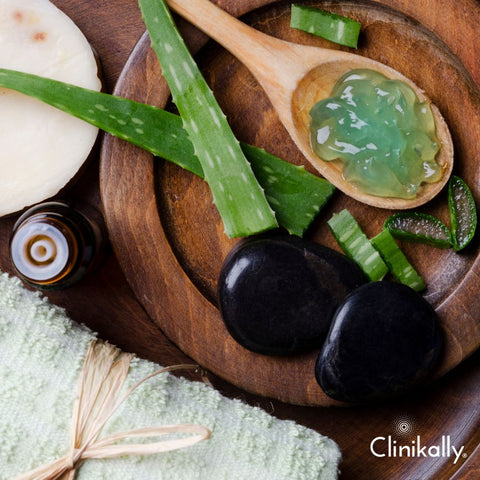
Aloe vera is a versatile ingredient that can be used in a variety of ways in your skin care routine. Here are some ways you can incorporate aloe vera into your daily regimen:
-
Aloe vera gel: Aloe vera gel is the most common form of aloe vera that is used in skin care. You can apply a thin layer of aloe vera gel on your face and body as a moisturizer or use it as a spot treatment for acne, sunburns, or other skin irritations.
-
Aloe vera cream: Aloe vera cream is a thicker, more hydrating version of aloe vera gel. It can be used as a night cream or as a moisturizer for dry skin.
-
Aloe vera toner: Aloe vera toner can help balance the pH of your skin and reduce the appearance of pores. You can make a DIY toner by mixing equal parts of aloe vera gel and water and applying it to your face with a cotton pad.
-
Aloe vera face mask: Aloe vera face masks can help hydrate and soothe your skin. You can make a simple mask by mixing aloe vera gel with honey and applying it to your face for 10-15 minutes.
-
Aloe vera hair mask: Aloe vera hair masks can help condition and nourish your hair. You can mix aloe vera gel with coconut oil or honey and apply it to your hair for 30 minutes before washing it off.
DIY Aloe Vera skin care recipes
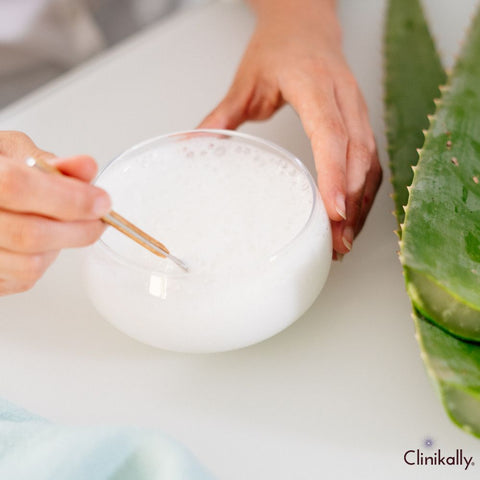
Here are some easy DIY aloe vera skin care recipes to try at home:
-
Soothing Aloe Vera Face Mask: Ingredients are 2 tablespoons of fresh aloe vera gel, 1 tablespoon of honey and 1 teaspoon of plain yogurt (optional). Mix the fresh aloe vera gel with honey in a bowl until well combined. Optionally, add plain yogurt to the mixture for additional moisturizing and soothing properties. Apply the mixture to your clean face and neck, avoiding the eye area. Leave the mask on for 15-20 minutes. Rinse off with lukewarm water and pat your skin dry. Follow up with your favorite moisturizer.
-
Hydrating Aloe Vera Facial Toner: Ingredients are 1/4 cup of aloe vera juice or fresh aloe vera gel, 1/4 cup of rose water and 1-2 drops of your favorite essential oil (such as lavender or rose, optional). Mix the aloe vera juice or gel with rose water in a clean bottle. Add a few drops of your chosen essential oil if desired, for added fragrance and skin benefits. Shake the bottle well to ensure all ingredients are thoroughly combined. After cleansing your face, apply the toner to your skin using a cotton pad or by spraying it directly onto your face.
-
Soothing Aloe Vera Sunburn Relief Gel: Ingredients are 1/4 cup of fresh aloe vera gel, 1 tablespoon of coconut oil (solidified) and 5-10 drops of lavender essential oil (optional, for additional soothing). Mix the fresh aloe vera gel with solidified coconut oil in a small bowl until well combined. Optionally, add a few drops of lavender essential oil for added soothing properties. Transfer the mixture to a clean container with a lid for storage. Apply the gel generously to sunburned areas of the skin as needed.
These DIY aloe vera skin care recipes will naturally soothe, hydrate, and nourish your skin. However, always perform a patch test before using any new skin care product, especially if you have sensitive skin or allergies. If you experience any irritation or adverse reactions, stop using immediately.
Incorporating Aloe Vera into daily beauty routine
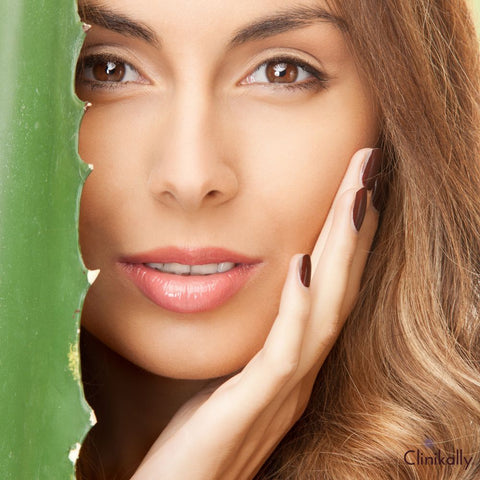
Incorporating aloe vera into your daily beauty routine can help your skin stay hydrated, soothe irritation, and promote overall skin health. Here are some ways to incorporate aloe vera into your daily routine.
-
Cleansing: Use aloe vera gel to gently remove dirt, oil, and makeup from your skin. Simply apply a small amount of aloe vera gel to your face, massage gently, and then rinse with lukewarm water. Aloe vera's cleansing properties can help clear clogged pores and leave your skin feeling refreshed.
-
Toning: After cleansing, use aloe vera toner to balance your skin's pH and tighten pores. You can make your aloe vera toner by mixing equal parts of aloe vera juice or gel with rose water or witch hazel. Apply the toner to your skin using a cotton pad or by spritzing it directly onto your face.
-
Moisturizing: Aloe vera gel is an excellent natural moisturizer that can hydrate your skin without leaving it feeling greasy. Use aloe vera gel as a lightweight moisturizer by applying it to your face and neck after cleansing and toning. It's suitable for all skin types, including oily and acne-prone skin.
-
Treating Skin Issues: Incorporate aloe vera gel into your routine to address specific skin concerns such as acne, sunburn, eczema, or dryness. Apply a thin layer of aloe vera gel to affected areas of the skin and leave it on overnight for intensive treatment. Aloe vera's anti-inflammatory and healing properties can help to relieve irritation, reduce redness, and promote skin repair.
-
Mixing with Other Products: Enhance the benefits of your existing skincare products by mixing them with aloe vera gel. Add a small amount of aloe vera gel to your favorite moisturizer, serum, or face mask to boost hydration and soothing effects.
-
Sun Protection: While aloe vera gel does not provide sufficient protection against UV radiation on its own, you can use it as an after-sun treatment to soothe sunburned skin. Apply aloe vera gel generously to sun-exposed areas to help alleviate discomfort and promote skin healing.
-
Hair Care: Don't forget about your hair! Incorporate aloe vera gel into your hair care routine by using it as a scalp treatment or hair mask. Massage aloe vera gel into your scalp to moisturise and relieve irritation, or combine it with your conditioner for added hydration and shine.
By incorporating aloe vera into your daily beauty routine, you can take advantage of its natural properties to achieve healthy, radiant skin and hair. Experiment with various methods of applying aloe vera to see what works best for your specific skin and hair needs.
Aloe Vera for sensitive skin management
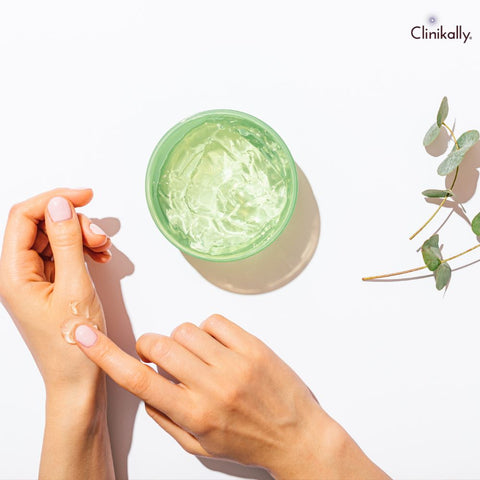
Using aloe vera for sensitive skin management can be highly beneficial due to its soothing, hydrating, and anti-inflammatory properties. Here are some pointers for adding aloe vera to your regimen for caring for sensitive skin:
-
Patch Test: Before using any new skincare product, including aloe vera gel, test a small area of your skin to see if there are any adverse reactions or sensitivities.
-
Choose Pure Aloe Vera: Select pure, organic aloe vera gel with no added fragrances, colours, or preservatives. Look for products that contain a high percentage of aloe vera (ideally 90-100%) to ensure maximum benefits for your sensitive skin.
-
Gentle Cleansing: Wash your face with a mild, fragrance-free cleanser and avoid harsh scrubbing or exfoliation, as these can irritate sensitive skin. After cleansing, use aloe vera gel as a gentle cleanser to remove any remaining impurities without stripping the skin's natural moisture.
-
Soothing Toner: Use aloe vera toner to soothe and balance sensitive skin. To make a soothing toner that reduces redness and inflammation, mix equal parts aloe vera gel and rose water or witch hazel.
-
Hydrating Moisturiser: Aloe vera gel is an excellent natural moisturiser for sensitive skin because it provides light hydration without clogging pores or causing irritation. After cleansing and toning, massage a thin layer of aloe vera gel onto your face and neck to soothe and moisturise your skin.
-
Spot Treatment: Use aloe vera gel as a spot treatment for areas of sensitivity or irritation, such as redness, inflammation, or allergic reactions. Apply a small amount of aloe vera gel directly to the affected area to help reduce discomfort and promote healing.
-
Sunburn Relief: Aloe vera gel is known for its cooling and soothing properties, making it an effective remedy for sunburned skin. Apply a generous amount of aloe vera gel to sunburned areas to help alleviate pain, reduce redness, and promote skin healing.
-
Hydrating Mask: Treat your sensitive skin with a hydrating mask made with aloe vera gel to nourish and soothe dry, irritated skin. Mix aloe vera gel with honey or yogurt to create a moisturizing mask, and leave it on for 10-15 minutes before rinsing off with lukewarm water.
-
After-Shave Treatment: Men with sensitive skin can use aloe vera gel to relieve razor burn and irritation. Apply a thin layer of aloe vera gel to freshly shaved skin to reduce inflammation and hydrate it.
-
Read Labels: Before incorporating aloe vera products into your skincare routine, carefully read the ingredient labels to ensure that there are no potential irritants or allergens that could aggravate sensitive skin.
You can help soothe irritation, reduce redness, and keep your sensitive skin hydrated and balanced by incorporating aloe vera into your daily skincare routine. However, if you have severe or persistent skin sensitivity, you should see a dermatologist for personalised skincare recommendations and treatment options.
Benefits of Aloe Vera for face, skin, and hair
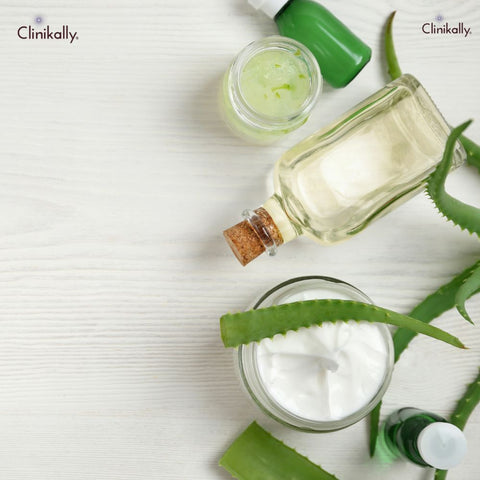
Aloe vera's high concentration of vitamins, minerals, enzymes, amino acids, and antioxidants provides numerous benefits to the face, skin, and hair. Here are some of the primary benefits of aloe vera for the face, skin, and hair:
Face:
-
Aloe vera gel is extremely hydrating and can replenish moisture in the skin without leaving a greasy residue, making it appropriate for all skin types.
-
Aloe vera has anti-inflammatory properties that can help to reduce redness, inflammation, and irritation, making it ideal for sensitive or acne-prone skin.
-
Aloe vera contains salicylic acid, which helps to clear clogged pores and reduce acne-causing bacteria. It also has astringent properties, which can help tighten pores and reduce excessive oil production.
-
Aloe vera is high in antioxidants, including vitamin C and E, which help to neutralise free radicals and protect the skin from premature ageing. Regular use may help to reduce the appearance of fine lines and wrinkles, and age spots.
-
Aloe vera has cooling and soothing properties that can help relieve sunburned skin. It reduces redness, inflammation, and discomfort while encouraging skin healing.
Skin:
-
Aloe vera gel is an excellent natural moisturizer that helps keep the skin hydrated and supple. It absorbs quickly into the skin and leaves no greasy residue, making it suitable for use on the face and body.
-
Aloe vera promotes cell regeneration and collagen synthesis, which speeds up wound, burn, and minor cut healing. It also has antimicrobial properties, which help to prevent infections.
-
Aloe vera contains enzymes that help exfoliate dead skin cells and promote cell turnover, giving you brighter, more radiant skin. Regular use can help to improve skin tone and texture.
-
Aloe vera can help reduce the appearance of scars and stretch marks by stimulating skin regeneration and reducing inflammation. It also improves skin elasticity, making it less prone to scarring.
-
Aloe vera can help soothe a variety of skin conditions, including eczema, psoriasis, and rosacea. Its anti-inflammatory and moisturising properties alleviate itching, redness, and irritation caused by these conditions.
Hair:
-
Aloe vera contains antibacterial and antifungal properties that help to keep the scalp healthy and prevent dandruff and infections.
-
Enzymes in aloe vera stimulate dormant hair follicles, which promotes hair growth. It also improves blood circulation to the scalp, nourishing the hair follicles and encouraging healthy hair growth.
-
Aloe vera gel moisturises and conditions hair, making it soft, shiny, and manageable. It helps to seal moisture into the hair shaft, reducing dryness and frizz.
-
Aloe vera helps to repair damaged hair by nourishing the follicles and strengthening the hair shaft. It contains vitamins and minerals that help to restore the hair's natural pH balance and repair damaged cuticles.
-
Aloe vera gel can be used as a natural hair styling gel to reduce frizz, define curls, and add volume to hair. It provides a light hold without weighing the hair down or making it stiff.
Benefits of aloe vera for face and skin
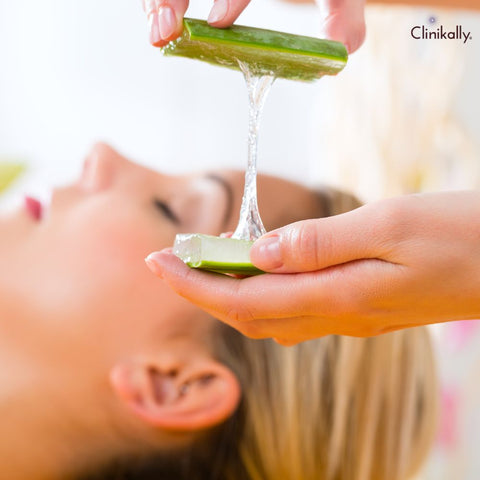
-
Moisturizes the skin: Aloe vera is a natural moisturizer that can help hydrate your skin without leaving it greasy or oily. It is easily absorbed by the skin, making it a great ingredient for dry or sensitive skin.
-
Soothes skin irritations: Aloe vera has anti-inflammatory properties that can help soothe skin irritations such as sunburns, rashes, and insect bites. It can also reduce the redness and itching associated with these conditions.
-
Reduces acne: Aloe vera contains salicylic acid, which is a common ingredient in acne treatments. This acid helps unclog pores and reduce the inflammation associated with acne.
-
Anti-aging properties: Aloe vera is rich in antioxidants that can help protect your skin from free radical damage, which can lead to premature aging. It can also help improve the elasticity and firmness of your skin.
-
Brightens skin: Aloe vera contains aloin, a compound that has been shown to have skin-brightening effects. It can help reduce the appearance of dark spots and improve the overall tone and texture of your skin.
Aloe Vera for acne treatment and skin brightening
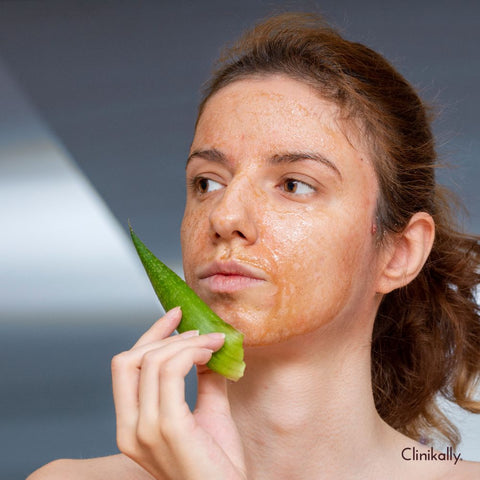
Aloe vera is renowned for its effectiveness in treating acne and promoting skin brightening due to its numerous beneficial properties. Here's how aloe vera can be used for acne treatment and skin brightening:
Acne Treatment:
-
Anti-inflammatory Properties: Aloe vera contains compounds that have anti-inflammatory effects, which can help reduce redness, swelling, and inflammation associated with acne.
-
Antibacterial and Antimicrobial Effects: Aloe vera has natural antibacterial and antimicrobial properties that can help combat acne-causing bacteria, such as Propionibacterium acnes (P. acnes).
-
Unclogs Pores: The salicylic acid present in aloe vera helps exfoliate dead skin cells and unclog pores, preventing the formation of acne lesions.
-
Soothing Effect: Aloe vera has a soothing effect on the skin, which can help alleviate discomfort and irritation caused by acne breakouts.
-
Moisturization: Despite its acne-fighting properties, aloe vera is gentle and moisturizing, making it suitable for use on acne-prone skin without causing excessive dryness.
Skin Brightening:
-
Exfoliation: Aloe vera contains enzymes that gently exfoliate the skin, removing dead skin cells and revealing brighter, smoother skin underneath.
-
Hydration: Aloe vera hydrates the skin, helping to improve its texture and appearance. Hydrated skin reflects light better, giving it a brighter and more radiant appearance.
-
Reduces Dark Spots: Aloe vera contains compounds that help fade dark spots and hyperpigmentation, leading to a more even skin tone.
-
Antioxidant Properties: Aloe vera is rich in antioxidants, which help protect the skin from oxidative damage caused by free radicals. This can help prevent dullness and promote a brighter complexion.
-
Promotes Cell Regeneration: Aloe vera stimulates cell regeneration and collagen production, leading to healthier and more youthful-looking skin.
Aloe Vera for sunburn relief and reducing scars
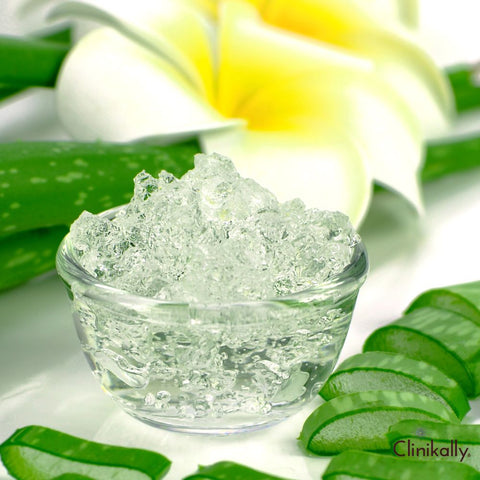
Aloe vera is well-known for its ability to soothe sunburns and reduce the appearance of scars. Here's how you can use aloe vera to treat sunburn and reduce scars:
Sunburn Relief:
-
Aloe vera has a naturally cooling sensation when applied to the skin, which can help soothe the burning sensation associated with sunburns.
-
Sunburns can cause the skin to become dry and dehydrated. Aloe vera gel is highly moisturizing and can help replenish lost moisture, promoting faster healing.
-
Aloe vera contains compounds that have anti-inflammatory effects, helping to reduce redness, swelling, and inflammation caused by sunburns.
-
Aloe vera promotes skin regeneration and repair, accelerating the healing process of sun-damaged skin and minimizing peeling and flaking.
-
Aloe vera has antimicrobial properties that help protect sunburned skin from secondary infections, preventing further irritation and complications.
Scar Reduction:
-
Aloe vera contains compounds that stimulate cell regeneration and collagen production, helping to promote the natural healing process of the skin and reduce the appearance of scars.
-
Aloe vera is highly moisturizing and helps keep the skin hydrated, softening the scar tissue and making it less noticeable over time.
-
Aloe vera's anti-inflammatory properties can help reduce redness, swelling, and irritation associated with scars, leading to a smoother and more even skin tone.
-
Aloe vera is rich in antioxidants, which help protect the skin from oxidative damage and prevent further scarring.
-
Regular application of aloe vera gel can improve the elasticity of the skin, making scars appear less raised and prominent.
By incorporating aloe vera into your skincare routine, you can effectively alleviate sunburns and reduce the appearance of scars, promoting healthier and more radiant skin. However, if you have severe sunburns or scars, or if you experience any adverse reactions, it's essential to consult with a dermatologist for proper evaluation and treatment.
Benefits of aloe vera for hair and scalp
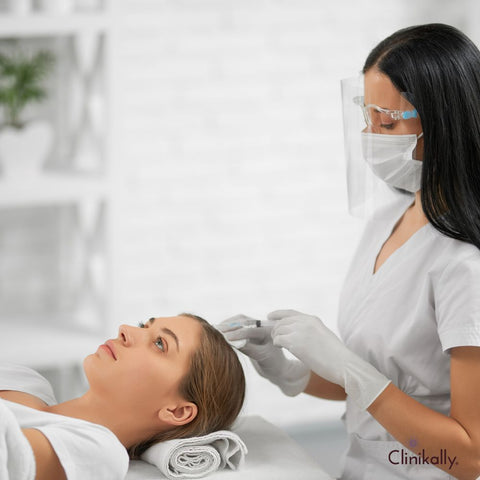
-
Promotes hair growth: Aloe vera contains enzymes that can help promote hair growth by removing dead skin cells from the scalp. This helps unclog hair follicles and stimulate new hair growth.
-
Conditions hair: Aloe vera can help condition your hair and make it softer and more manageable. It can also reduce frizz and prevent hair breakage.
-
Reduces dandruff: Aloe vera has antifungal properties that can help reduce dandruff and soothe an itchy scalp. It can also help reduce the inflammation associated with dandruff.
-
Adds shine: Aloe vera can help add shine to your hair and make it look healthier and more lustrous.
Aloe Vera for hair growth and dandruff control
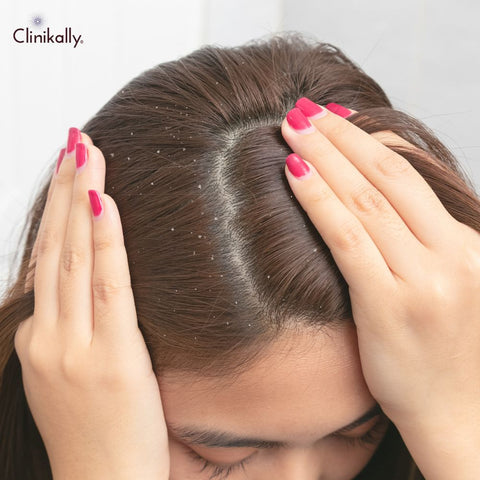
Aloe vera is a versatile plant with numerous benefits for hair growth and dandruff control. Here's how to use aloe vera effectively for these purposes:
Hair Growth:
-
Aloe vera contains enzymes that help cleanse the scalp by removing excess oil and dead skin cells, creating a healthy environment for hair growth.
-
Aloe vera gel contains proteolytic enzymes that can penetrate the scalp and stimulate dormant hair follicles, promoting new hair growth.
-
Aloe vera is hydrating and helps balance the scalp's pH level, preventing dryness and irritation that can inhibit hair growth.
-
Aloe vera has anti-inflammatory properties that soothe and calm irritated scalp conditions, allowing for better hair growth.
-
Aloe vera contains vitamins and minerals, such as vitamins A, C, and E, which nourish the hair follicles and strengthen the hair shaft, reducing breakage and promoting healthier, thicker hair.
Dandruff Control:
-
Aloe vera has natural antifungal properties that can help eliminate the fungus responsible for dandruff, such as Malassezia furfur.
-
Aloe vera's anti-inflammatory properties can relieve dandruff-induced scalp irritation, reducing itching and flaking.
-
Aloe vera helps to balance the pH of the scalp, making the environment less conducive to fungi that cause dandruff.
-
Aloe vera moisturises and hydrates the scalp, preventing dryness and flakiness caused by dandruff.
-
Aloe vera contains vitamins and minerals that nourish the scalp and improve overall scalp health, lowering the risk of dandruff recurrence.
Including aloe vera in your hair care routine can help promote hair growth and control dandruff, keeping your scalp healthy and your hair nourished. However, if you have any scalp conditions or allergies, you should perform a patch test before using aloe vera or seek personalized advice from a dermatologist.
Aloe Vera: A Natural Elixir for Overall Beauty and Wellness
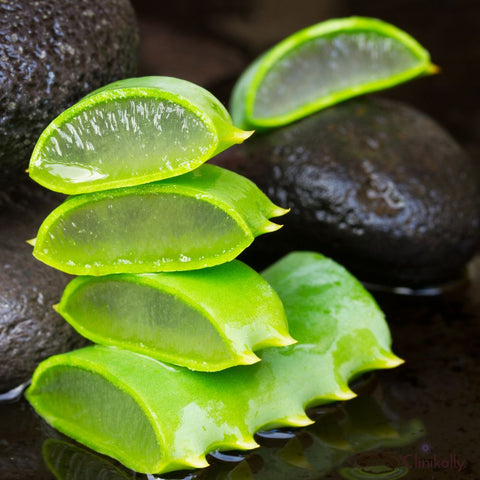
Aloe vera is a natural elixir for overall beauty and wellness, providing numerous benefits to the skin, hair, and overall health. Here's why aloe vera is widely regarded as a versatile beauty and wellness remedy:
-
Aloe vera juice can improve digestive health by soothing and healing the digestive tract, thereby alleviating symptoms of acid reflux, indigestion, and irritable bowel syndrome (IBS).
-
Aloe vera contains vitamins, minerals, and antioxidants that boost immune function and protect the body from infections and illnesses.
-
Purification of the liver, kidneys, and colon as well as the removal of toxins from the body are possible with the aid of aloe vera juice, which is a natural detoxifier.
-
Aloe vera juice may help with weight loss by improving digestion, increasing metabolism, and suppressing appetite.
-
Aloe vera contains compounds that help lower cholesterol and blood sugar levels, which reduces the risk of cardiovascular disease and diabetes.
Including aloe vera in your beauty and wellness regimen can help you achieve healthy, glowing skin, luscious hair, and overall well-being. Whether applied topically or consumed internally, aloe vera provides a natural and effective way to improve beauty and promote wellness from the inside out. However, it is critical to use high-quality, pure aloe vera products and consult with a healthcare professional before incorporating aloe vera into your daily routine, especially if you have any underlying health issues or allergies.

















1 comment
Floraison Herbals
Thanks for pointing out these great benefits – I’m always excited to find new herbs and natural remedies that can help skin look better and healthier.
Thanks for pointing out these great benefits – I’m always excited to find new herbs and natural remedies that can help skin look better and healthier.